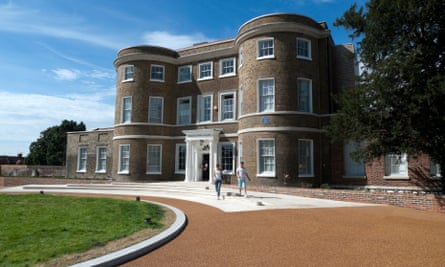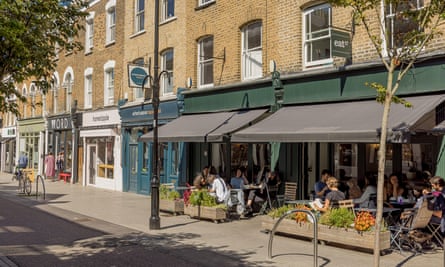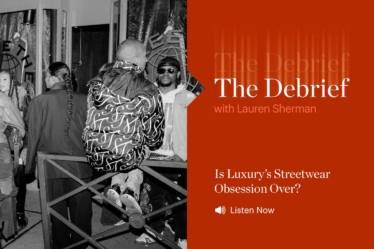
On Wednesday the lord of Walthamstow, an 82-year-old retired estate agent named Phillip Leigh, is putting his title up for auction. His is one of about 2,000 nominal lordships. You might be able to buy a peer, but you can’t buy a peerage. A lordship is not a peerage. It doesn’t come with a place in the House of Lords, there’s no land, and, although they are known as “lord of the manor” titles, there’s also no manor.
Still, as Leigh is quick to point out, unlike many off-the-peg lordships, his one goes back a long way.
“There are a lot of barons,” he says, sitting in the cafe of the William Morris Gallery in Walthamstow, north-east London. “You can buy a barony for about a hundred quid. It’s not the same thing. They don’t have the history. My title is actually registered.”
Where?
With the Land Registry, he explains, even though it is not attached to any land. It’s a slightly baffling concept, perhaps a bit like an analogue version of non-fungible tokens (NFTs), those certifications of ownership of digital art that are a fashionable new way of owning something that doesn’t really exist, but which nonetheless apparently accounted for $17bn of business in 2021.
According to Leigh, the lord of Walthamstow dates back to the Domesday Book, in 1085, and perhaps longer, to pre-Norman times. Originally it came with a good deal of land, its boundaries extending beyond Walthamstow’s current confines into Tottenham and Chingford. But various subdivisions and divestments finally left the title shorn of all territorial claims, an eponym expelled from its own estate.
Which raises the question of why on earth Leigh bought it in the first place, back in 1989? He says it was for three reasons: his own interest in history, the fact that he was a local boy who grew up in Knebworth Avenue in Walthamstow, and that he “saw it as an investment”.
He doesn’t directly say how much he paid for it, but it must have been around £6,000 given that he says his estimate of its current value is based on what’s happened to local property prices over the same period. A flat that cost £15,000 in 1989, he says, now costs £500,000. “If you relate it accordingly,” he says, “the lordship’s worth 200 grand.”
This strikes me as a very generous calculation, given that housing is essential and in expensively short supply in London, whereas a title isn’t a roof over your head, or even earth beneath your feet.
Although it was a poor area when he was a child, probably best known for its greyhound racing track (which closed in 2008), Walthamstow has been heavily gentrified over the past decade or so. Where once the William Morris Gallery, in the Grade II*-listed manor house that was the artist-designer’s family home, was a conspicuous anomaly, it’s now rather emblematic of the Farrow & Ball crowd that has moved in.
Of course, Morris, a radical socialist, would have disapproved of titles. But then Leigh says he’s hardly used his, other than on his bank account.

There was one occasion when he and a golf buddy booked a weekend at a golf course hotel, only to find that their room had one double bed, and Leigh was adamant that he didn’t want to share it with his friend. So his friend protested to the receptionist, who said there was nothing he could do.
“In that case,” said the friend, “can you tell my friend, Lord Walthamstow, here that he has to share a bed with me.”
A room with two single beds duly appeared.
after newsletter promotion
It’s an anecdote that says a lot about British class deference, the bred-in-the-bone instinct to be impressed or in some way fascinated by the aristocracy. Even in contemporary films such as Saltburn, the idea that the upper classes demand our mesmerised attention, rather than our indifference or scorn, is alive and well.
By this measure a faux lord like Leigh might seem a ridiculous figure. But why should that be so? After all, his family never stole anyone’s lands or lived in sumptuous luxury on the backs of armies of forgotten peasants. The joke is surely on us if we rank a nominal lord some way beneath a hereditary one.
I ask Leigh if being Jewish had any significance in his decision to buy the title. Jews were never part of the feudal aristocracy. In 1290, 200 years after Lord Walthamstow was first mentioned, England expelled all of its Jews. Laying claim to a title, it might almost be an outsider’s in-joke.
“It has, of course, crossed my mind,” he says.
One of the charities to which he will donate some of the money from the auction is the Community Security Trust, an organisation that seeks to protect Jews from antisemitism and related threats.
Yet how much money is he likely to get? There’s a reserve price of £65,000, though he’s hoping for significantly more. The record paid for a lord of the manor title was £171,000 for the lordship of Wimbledon, sold by Princess Diana’s brother, Earl Spencer, in 1996 (during the tennis championship).
“The person who buys this,” he says, “I guarantee will have the Walthamstow connection. Otherwise, why?”
It’s a good question. We’ll have to wait until Wednesday for the answer.



